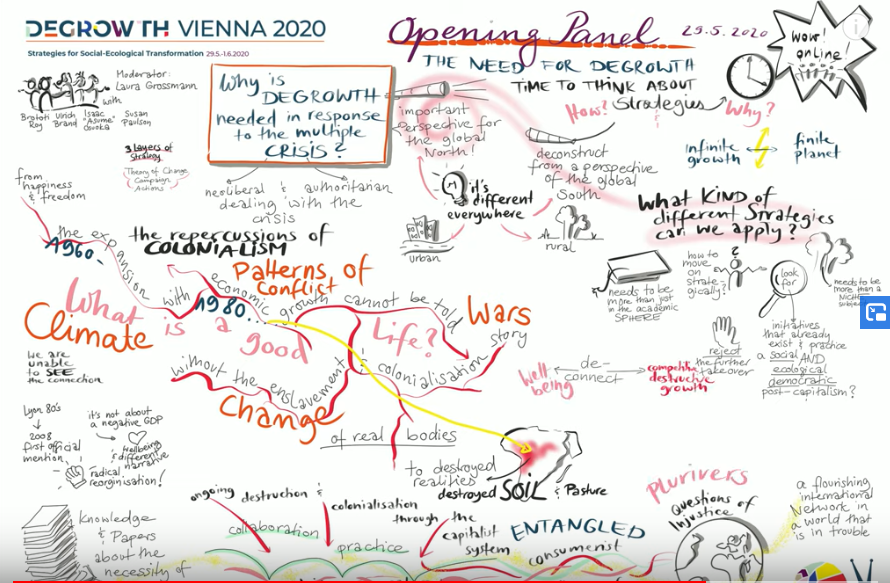After the excitement of an intense three-days Beyond Growth Conference 2023 (BGC), attended by 7,000 participants (on-site and online), the time is ripe to distil critical reflections. The conference was celebrated as a historic moment by the degrowth movement, with many arguing that the mere fact that post-growth could be discussed at the European Parliament was proof enough that this paradigm is gaining ground. And indeed, bringing together an impressive crowd of world-renowned scientists, activists and (few) European politicians to discuss post-growth Europe within the walls of an "intrinsically growthist" institution is exceptional. That said, beyond the value of having such a platform to position post-growth as a plausible way forward, important blind spots were revealed.
Degrowth must be anti-colonial or else “it’s bullshit”
Throughout the conference, eminent scholars presented the quintessence of their research and pointed to possible pathways to turn findings into policies. The message is unequivocal. The growth regime has brought the Earth system out of balance, planetary limits are being exceeded at unsustainable levels, leading to an acceleration of the climate and biodiversity crises. The brunt of the consequences of these crises are being borne by the populations of the Global South, least (if at all) responsible for them. The solution to sustaining the habitability of our planet is not green growth, a chimera not supported by empirical evidence. Yet the voices of the EU executive formed an unconvincing chorus praising green growth as the desirable and unavoidable way forward, obscuring the extraterritorial impacts that their agenda entails. The Green Deal defended by the EU is bound to perpetuate centuries of European colonial plunder translating into ever more “Green Sacrifices Zones”.
For obvious reasons, degrowth (a word carefully avoided during the conference) cannot be anything else than a decolonial endeavour, or else “it’s bullshit” as Raj Patel coined in the panel “Beyond growth, beyond Europe”. This panel exposed the (neo)colonial nature of the capitalist system aiming for endless growth. The continued colonial capitalist venture has resulted in plundered and suffocated peripheries for the exclusive benefit of the minority world. Key questions were addressed. What is measured by GDP growth? Where does this GDP growth come from? Where are the energy and materials that it requires extracted from? By whom? Who benefits from its proceeds? And who pays the true costs of its (purposedly hidden, and never accounted for) externalities?
The discussion clearly demonstrated that the patterns of unequal exchange are choking the peoples of the global south while at the same time depriving them of their own territories, resources and productive capacities with the sole aim of ever more capital accumulation in the GDP-rich North. This is the result of centuries of exploitation and organised plundering, which has accelerated since the 1990s, largely thanks to international institutions (colonial by design) such as the International Monetary Fund, the World Trade Organisation and the World Bank.
This panel should have been the opening plenary. A post-growth world cannot be laid on colonial foundations. This needs to be heard, understood, and acknowledged widely. There can be no degrowth without reparations: a process that begins with acknowledging the extent of the damage done, followed by official apologies and a restorative justice process which entails debt cancellation, financial compensation, drastic reductions in GHG emissions in the North, the unconditional relocation of climate refugees and intense cooperation to prevent further loss and damage. With its odious border regime, unsuitable bioeconomy strategy and Green Deal agenda, the EU appears structurally unfit to initiate such a process.
Degrowth is a democratic endeavour
Despite being a vivid issue within the EU and a key aspect of a degrowth transition, democracy was not granted specific focus at the conference. In a grim context of far-rightisation of politics and growing distrust in representative democracy, a dedicated panel on democracy in a post-growth paradigm would have been most welcome. There is a consensus in the degrowth movement that more democracy is needed to realise a post-growth society, and that broadening and distributing decision-making power is required. Some advocate for localist direct democracy models akin to municipalism. Others propose more reformist approaches proposing to build on existing representative democratic systems by incorporating deliberative processes.
During the conference, the rare allusions to democracy were mostly congruent with the reformist stream. The French convention on climate (FCC) was briefly mentioned by a panellist who contended that well-informed citizens do propose more “radical” transition agendas than their elected representatives. Whether this statement holds true in all cases is open for debate. And even if it did, it would not be enough on its own. The 149 proposals that emerged from the FCC’s deliberative process were partly vetoed by Emmanuel Macron right away, to then be emptied of their substance in the ensuing parliamentary process. Eventually, this experiment which aimed at restoring some trust in the French executive resulted in paramount defiance towards political institutions and elected officials. In truth, existing examples of citizens' assemblies show that regaining democratic decision-making to engage a social-ecological transformation will require more than an experimental deliberative add-on here and there.
Interestingly, the direct democracy stream emerged from the ground at BGC. Frustrated by the lack of room for participants’ engagement within the plenaries and panels, some decided to organise a people’s assembly right at the end of the conference. This spontaneous act was both intriguing and energising. The core of the discussions revolved around assessing the strengths and weaknesses of the conference and reflecting on how to bring the messages “outside of the bubble”. A critical question considering the very low levels of media attention received by the conference.
As historic as the conference may have been, much remains to be done to strengthen the degrowth paradigm and avoid its co-option by institutional politicians of all stripes, but also to create a genuine dynamic for transformation.

Celebrate degrowth on June 4th 2022 - this year’s Global Degrowth Day! We call on everyone inspired by degrowth to organize (online) actions and events invoking the theme of Climate Justice. As usual, on Global Degrowth Day you are invited to explore the different ways out of growth-dependency, and to connect to inspiring (local) initiatives working on new paradigms relating to sustaina...

On August 14th, an uprising of art installations and happenings emerged in the Old North End neighborhood of Burlington, Vermont. Two days later, they all disappeared. Through these art pieces, community members and local organizations explored today’s tensions and possible paths toward desirable futures. Burlington residents navigated the neighborhood on self-guided tours, following a m...

The conference “Degrowth Vienna 2020: Strategies for Socio-ecological transformation” took place online between May and June 2020, in the midst of a pandemic crisis. This two-part piece will firstly reflect upon the conference (part I) and then propose ways to move forward (part II). As a member of the Advisory Board, I was partly involved in the discussions regarding the planning of the...